
DISCOGRAPHY
Burzum "Dauði Baldrs" ("Balder's Død") 1997
Misanthropy Records / Cymophane Productions
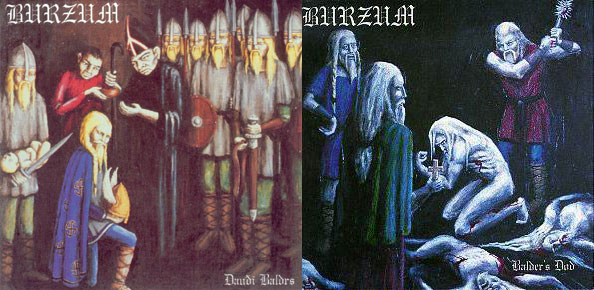
Tracklist:
Dauði Baldrs (The Death of Baldr)
Hermoðr Á Helferð (Hermoðr on a Journey to Hel)
Bálferð Baldrs (Baldr's Balefire)
Í Heimr Heljar (In Hel's Home)
Illa Tiðandi (Ill Tidings)
Móti Ragnarokum (Towards Ragnarök)
Buy:

Hljómlist "Dauði Baldrs" es framleiða af Varg Kvisling Larsson Vikernes i Breiðablik Tónholl
Myndlist "Dauði Baldrs" es framleiða af Tanya Stene
Allir kvæði sen frá Gylfaginning tekit.
Release date: 14.10.1997
English translation of the stories by Tomas Robertson
© 1997 Misanthropy Records / Cymophane Productions
Español
| ENGLISH | DEUTSCH | FRANÇAIS | Logic (Loki) led by its desire for reason, unites the blindness in us (Hoðr) with the death religions (the parasitic Mistletoe on the tree of life, Yggdrasill), and kills there with the meaning of our lives (Baldr). The meaning of life is deeply lost in the unconscious of our human psyche (Helheimr). Some people are motivated by the Uranus-energy (Ódinn/Hermoðr) and they try to travel within themselves in order to rediscover there the meaning of life. But this is not successful, not this way. When we (Þórr), bitter, bid farewell to our beloved meaning of life, we also bid farewell to any kind of trust (Lítr) and burned it at the stake. The entire humanity suffers, we burn from within, we cry. The Logic (of the modern science) which with its angry scientific drive, its "arrogance" and its contradictions, keeps the Occultists (Hermoðr) from rediscovering the meaning of life. Nothing evil is behind that, only cold and calculating logic. Logic in its lack of feeling cries dry tears. This leads to Ragnarok; Beginning, Cause, Symbol, Witness, Destiny and Twilight of the Gods. The battle in the human psyche is fought between the conscious mind (Æsir) and the unconsciousness (Jotunn). No Jotun returns alive from Asgard (Consciousness). | Logik (Loki), geleitet von seinem Bedürfnis nach Vernunft, vereinigt die Blindheit in uns (Hoðr) mit den Todes-Religionen (die parasitische Mistel auf dem Baum des Lebens, Yggdrasill), und tötet damit den Sinn unseres Lebens (Baldr). Der Sinn des Lebens ist tief im Unterbewusstsein unserer menschlichen Psyche (Helheimr) verschüttet. Einige werden von der Uranus-Energie (Óðinn/Hermoðr) motiviert und versuchen, zur inneren Ebene zu reisen, um dort den Sinn des Lebens wiederzuentdecken. Aber dies ist nicht erfolgreich, nicht auf diesem Wege. Als wir (Þórr) verbittert von unserem geliebten Sinn des Lebens Abschied nahmen, verabschiedeten wir uns auch von jeglichem Vertrauen (Lítr) und verbrannten es auf dem Scheiterhaufen. Die gesamte Menschheit leidet, wir brennen von innen heraus, wir weinen. Außer Logik (der modernen "Wissenschaft"), welche mit ihrem "wissenschaftlichen Zornesdrang", ihres "Besserwissens" und Entgegenwirkens die Okkultisten (Hermoðr) davon abhält, den Sinn des Lebens wiederzufinden. Nichts Böses befindet sich dahinter, nur kalte und kalkulierende Logik. Logik, in ihrer Gefühlslosigkeit, weint trockene Tränen. Dies führt zu Ragnarök; Anfang, Ursache, Zeugnis, Zeichen, Schicksal und Zweilicht der Götter. Die Schlacht in der menschlichen Psyche wird zwischen dem bewussten Verstand (Æsir) und dem Unterbewusstsein (Jotunn) ausgetragen. Kein Jotun kehrt lebendig von Asgarð (Bewusstsein) wieder. | Logic (Loki), mu par le désir de résoudre ses problèmes, conduit l'aveuglement en nous (Hoðr) à s'unir avec les religions de la mort (le gui parasitant l'arbre de vie, Yggrdrasill) et, ce faisant, engendre l'anéantissement du sens de la vie (Baldr). Le sens de la vie est refoulé au plus profond du royaume de l'inconscient de la psyché humaine (Helheimr). Quelques-uns puisent dans l'énergie Uranienne (Óðinn/Hermoðr) une force pour essayer d'atteindre le niveau intérieur, afin d'y redécouvrir le sens de la vie. Mais cela ne marche pas, pas de cette façon. Lorsque nous (Þórr) renonçâmes, aigris, à notre bien aimé sens de la vie, nous renonçâmes également à toute confiance (Lítr) et la brûlâmes aussi sur le bûcher crématoire. L'être humain tout entier souffre, nous nous consumons de l'intérieur, nous pleurons. À part la logique (la "science" moderne) qui empêche les occultistes (Hermoðr) de retrouver le sens de la vie à cause de son "mépris scientifique", sa "connaissance supérieure" et sa neutralisation. Rien de malin derrière tout ceci, seulement une froide et implacable logique. La logique, dépourvu d'émotions, pleure des larmes sèches. Ceci nous mène à Ragnarok, le commencement, la cause, le témoignage, le signe, la destiné et le crépuscule des dieux, le conflit interne de la psychée humaine entre le conscient (Æsir) et l'inconscient (Jotunn). Aucun Jotun ne revient vivant d'Asgarð (la conscience). |
|---|
Lyrics and Stories
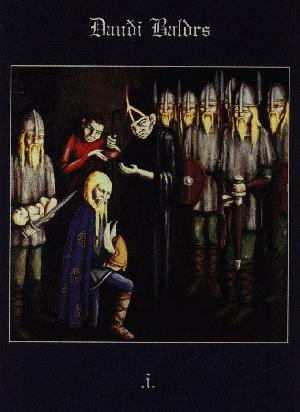 |
|
| Dauði Baldrs | The Death of Baldr |
|---|---|
| Þat er upphaf þessar sogu at Baldr inn góða dreymði drauma stóra ok hættliga um lif sitt. En er hann sagði Ásunum draumana þa báru peir saman ráð sín, ok var þat gert at beiða griða Baldri fyrir alls-konar háska, ok Frigg tók svardaga til þess at eira skyldu Baldri eldr ok vatn, járn ok alls-konar málmr, steinar, jorðin, viðirnir, sóttirnar, dýrin, fuglarnir, eitr, ormar. En er þetta var gert ok vitat, þá var þat skemtun Baldrs ok þasanna at hann skyldii standa upp á þingum en allir aðrir skyldu sumir skjóta á hann, sumir hoggva til, sumir berja grjóti. En hvat sem at var gert, sakaði hann ekki, ok þótti þetta gllum mikill frami. En er þetta sá Loki Laufeyjarson þá likaði honum illa er Baldr sakaþi ekki. Hann gekk til Fensalar til Friggjar ok brá sér í konu líki. þá spyrr Frigg ef sú kona vissi hvat Æsir hgfðusk at a þinginu. Hon sagði at allir skutu at Baldri, ok þat at hann sakaði ekki. Þá mælir Frigg:
"Eigi munu vápn eða viðir granda Baldri. Eiða hefi ek þegit af gllum þeim." Þá spyrr konan: "Hafa allir hlutir eiða unnit at eira Baldri?" Þá svarar Frigg: "Vex viðarteinungr einn fyrir vestan Valholl. Sá er mistilteinn kallaðr. Sá þótti mér ungr at krefja eiðsins." Því næst hvarf konan á braut. En Loki tók mistiltein ok sleit upp ok gekk til þings. En Hoðr stóð útarliga í mannhringinum því at hann var blindr. Þá mælir Loki við hann: "Hví skýtr þú ekki at Baldri?" Hann svarar: "þvíat ek sé eigi hvar Baldr er, ok þat annat at ek em vápnlauss." þá mælir Loki: "Gerðu þó í líking annara manna ok veit Baldri sæmð sem aðrir menn. Ek mun vísa þér til hvar hann stendr. Skjót at honum vendi þessum." Hoðr tók mistiltein ok skaut at Baldri at tilvísun Loka. Flaug skotit í gognum hann ok fell hann dauðr til jaðar, ok hefir pat mest óhapp verit unnit með goðum ok monnum. Þá er Baldr var fallinn þá fellusk glumm Ásum orðtok ok svá hendr at taka til hans, ok sá hverr til annars, ok váru allir með einum hug til þess er unnit hafði verkit. En engi mátti hefna, þar var svá mikill griðastadr. En þá er Æsirnir freistuðu at mæla þá var hitt þó fyrr at grátrinn kom upp svá at engi mátti gðrum segja með orðunum frá sínum harmi. En Óðinn bar þeim mun verst þenna skaða sem hann kunni mesta skynn hversu mikil aftaka ok missa Ásunum var i fráfalli Baldrs. En er goðin vitkuðusk þá mælir Frigg ok spurði hverr sá væri með Ásum er eignask viildi állar astir hennar ok hylli ok vili hann ríða á Helveg Baldr heim í Ásgard. En sá er nefndr Hermóðr inn hvati, sveinn Óðins, er til þeirar farar varð. Þá var tekinn Sleipnir, hestr Óðins, ok leiddr fram, ok steig Hermóðr a þann hest ok hleypti braut. |
And the beginning of this story is that Baldr the good dreamed great dreams boding peril to his life. And when he told the Æsir of the dreams they took council together and it was decided to request immunity for Baldr from all kinds of danger, and Frigg received solemn promises so that Baldr should not be harmed by fire and water, iron and all kinds of metal, stones, the earth, trees, diseases, the animals, birds, poisons, snakes. And when this was done and confirmed it then became entertainment for Baldr and the Æsir that he should stand up at assemblies and all others should shoot at him or strike him or throw stones at him. But whatever they did he remained unharmed, and they all thought this a great glory. But when Loki Laufeyiarson saw this he was not pleased that Baldr war unharmed. He went to Fensalir to Frigg and changed his appearance to that of a woman. Then Frigg asked this woman if she knew what the Æsir were doing at the assembly. She said that everyone was shooting at Baldr, and moreover that he was unarmed. Then said Frigg:
"Weapons and wood will not hurt Baldr. I have received oaths from them all." Then the woman asked: "Have all things sworn oaths not to hurt Baldr?" Then Frigg replied: "There grows a shoot of a tree to the west of Val-hall. It is called mistletoe. It seemed young to me to demand an oath from." Straight away the woman disappeared. And Loki the mistletoe and went to the assembly. Hod was standing at the edge of the circle of people, for he was blind. Then Loki said to him: "Why are you not shooting at Baldr?" He replied: "Because I cannot see where Baldr is and I have no weapon." Then said Loki: "Follow other people's example and do Baldr much honour. I will direct you to where he is standing and you can shoot at him with this stick." Hod took the mistletoe and shot at Baldr in Loki's direction. The missile flew through him and he fell dead to the ground. And this was the unluckiest deed done among the gods and men. When Baldr had fallen all of the Æsir's tongues failed them as did their hands from lifting him up. And they all looked at each other and were all one mind toward the one who had done the deed. But none could take vengeance as Val-hall was a place of sanctuary. When the Æsir tried to speak then what happened first was that weeping came out, so that none could tell another in words of his grief. But it was Odin who took this injury the hardest of all in that he had the best idea as to the amount of deprivation and loss the death of Baldr would cause the Æsir. When the gods came to themselves once more, Frigg spoke and asked who wished to earn all her love and favour and was willing to ride the rode to Hel and seek Baldr and to offer Hel a ransom for Baldr to return to Asgard. Hermod the bold, Odin's boy the name of the one who undertook the journey. Then Odin's horse, Sleipnir was fetched and led forward. Hemod then mounted the horse and galloped away. |
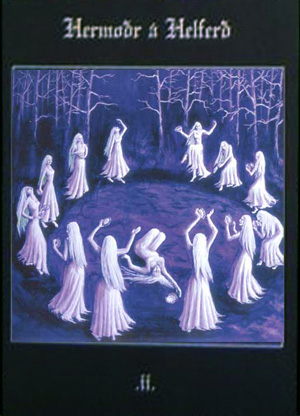 |
|
| Hermoðr Á Helferð | Hermoðr on a Journey to Hel |
| En þat er at segja frá Hermóði at hann reið niu naetr døkkva dala ok djúpa svá at hann sá ekki fyrr en hann kom til árinnar Gjallar ok reið a Gjallar brúna. Hon er þokð lýsigulli. Móðguðr er nenfd mær sú er gaetir brúarinna. Hon spurði hann at nafni eða ætt ok sagði at hinn fyrra dag riðu um brúna fimm fylki drauða manna.
"En eigi dyrn brúin minnr undir einum þér ok eigi hefir þú lit dauðra manna. Hví ríðr pú hér á Helveg?" Hann svarar at "ek skal ríða til Helja at leita Baldrs. Eða hvárt hefir þú makkvat sét Baldr á Helvegi?" En hon sagði at Baldr hafði par ridit um Gjallar brú, "en niðr ok norðr Liggr Helvegr." Þá reið Hermóðr þar til er hann kom at Helgrindum. Þá sté af hestinum ok gyrði hann fast, steig upp ok keyrði hann sporum. En hestrinn hljóp svá hart ok yfir grindina at hann kom hvergi nær. Þá reið Hermóðr heim til hallarinar ok steig af hesti, gekk inn í hollina. |
But there is this to tell of Hermod, that he rode for nine nights through valleys so dark and deep that he saw nothing until he came to the river Gioll and rode onto the Gioll bridge that is covered with glowing gold. There is a maiden guarding the bridge called Modgud. She asked him his name and lineage and said that the other day there had been five battalions of dead men that had ridden over the bridge.
"But the bridge resounds no less under you, and you do not have the colour of dead men. Why are you riding here on the road to Hel". He replied: "I am to ride to Hel to seek Baldr. Have you seen anything of Baldr on the road to Hel?" And she said that Baldr had ridden there over the Gioll bridge. But downwards and northwards lies the rode to Hel. Then Hermod rode on until he came unto Hel's gates. When he reached the gates of Hel he dismounted from his horse and tightened its girth, mounted and spurred it on. The horse then jumped over the gate and Hermod rode on to the hall and went in. When he went into the hall he saw sitting in the seat of honour his brother, Baldr. |
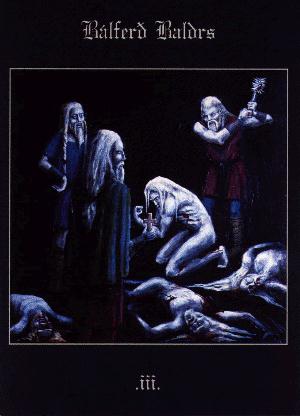 |
|
| Bálferð Baldrs | Baldr's Balefire |
| En Ædirnir tókulu lík Baldrs ok Flutti til sæver. Hringhorni hét skip Baldrs. Hann var allra skipa mestr. Hann vildu goðin fram setja ok gera þár á bálfgr Baldrs. En skipit gekk hvergi fram. Þá var sent í Jgtunheima eptir gýgi þeiri er Hyrrokkin hét. En er hon kom ok reið vargi ok hafði hoggorm at taumu þá hljóp hon af hestinum, en Óðinn kallaði til berserki fjóra at gæta hestsins, ok fengu þeir eigi hadit nema þeir feldi hann. Þá gekk Hyrrokkin á framstafn nokkvans ok hratt fram í fyrsta viðbbragði svá at eldr hraut ór hlunnunum ok lond oll skulfu. Þá varð Þórr reiðr ok greip hammarin ok myndi þá brjóta hofuð hennar áðr en goðin oll báðu henni friðar. Þá var borit út á skipit lík Baldrs, ok er þat sá kona hans Nanna Nespsdóttir þá sprakk hon af harmi ok dó. Var hon borin á bálit ok slegit í eldi. Þá stóð Þórr at ok vígði bálit með Mjolni. En fyrir fótum hans rann dvergr nokkur. Sá er Litr nefndr. En Þórr spyrndi fæti sinum á hann ok hratt honum í eldinn ok brann hann. | So the Æsir took Baldr body and carried it to the sea. Hringorni was the name of Baldr's ship. It was the biggest of all ships. The Æsir planned to set it out to sea with Baldr aboard for this final journey. But the ship refused to move. So they went to giantland to seek the princess Hyrrokin. When she arrived, riding a wolf and using Vipers as reins she dismounted the steed and Odin summoned four berserks to look after the steed but they were unable to hold without knocking it down. Then Hyrrokin went to the prow of the boat and pushed it out with the first touch so that flames flew from the rollers and all the lands quaked. Then Thor got angry and grasped his hammer and was about to her head until the gods begged for her grace. Then Baldr's body was carried out onto the ship, when his wife Nanna, Nep's daughter saw this she collapsed with grief and died. She was then carried onto the pyre and it was then set alight. Thor then consecrated the pyre with Miollnir, but a certain dwarf named Lit ran in front of his feet. Thor kicked at him with his foot, thrust him into the fire and he was burned. |
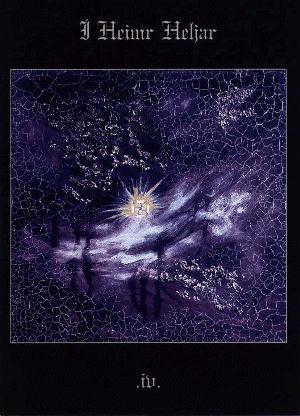 |
|
| Í Heimr Heljar | In Hel's Home |
| Sá Par sitja í onduugi Baldr bróður sinn, ok dvalðisk Hermóðr par um nóttina. En at morni þá beiddisk Hermóðr af Helju at Baldr skyldi ríða heim með honum ok sagði hversu mikill grátr var með Ásum. En Hel sagði at þat skyldi svá reyna hvárt Baldr var svá ástsæll sem sagt er.
"Ok ef allir hlutir í heiminum, kykvir ok dauðir, gráta hann, þá skal hann fara til Ása aptr, en haldask með Helju ef nakk varr mælir við eða vill eigi gráta." Þá stóð Hermóðr upp, en Baldr leiðir hann út ór hollunni ok tók hringinn Draupni ok serdi Óðni til minja, en Nanna sendi Frigg ripti ok enn fleiri gjafar; Fullu fingrgull. |
In the morning Hermod begged from Hel that Baldr might ride home with him and told of the great weeping amongst the Æsir. However, Hel said that she must be certain that Baldr was this loved amongst the people. She said in the following way:
"And if all living things in the world, dead and alive, weep for him, then he shall go back to Asgard. But he shall be kept in Hel if anything refuses to weep". Then Hermod got up and Baldr went with him out of the hall and took the ring Draupnir which he sent to Odin as a keepsake, he sent Nanna and Frigg a linen robe, and other gifts also; to Fulla a finger-ring. |
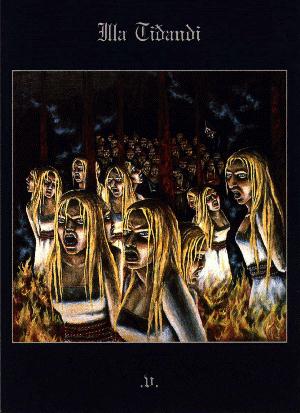 |
|
| Illa Tiðandi | Ill Tidings |
| Þá reið Hermóðr aptr leið sína ok kom í Ásgarð ok sagði oll tíðindi þau er hann hafði sét ok heyrt.
Þvi næst sendu Æsir um allam heim ørindreka at biðja at Baldr væri grátinn ór Helju. En allir gerðu þat, menninir ok kykvendin ok jorðin ok steinarnir ok tré ok allr málmr, svá, sem þú munt sént hafa at pessir hlutir gráta þá er þeir koma ór frosti ok í hita. Þá er sendimenn fóru heim ok hofðu vel rekit sín eyrindi, finna þeir í hellinokkvorum hvar gýgr sat. Hon nefndisk Pokk. Þeir biðja hana gráta Baldr ór Helju. Hon segir: "Þokk mun gráta þurrum tárum Baldrs bálfarar. Kyks né dauðs nautka ek karls sonar: haldi Hel því er hefir." En þess geta menn at þar hafi verti Loki Laufeyjarrson er flest hefir illt gert með Ásum. |
Then Hermod rode back to Asgard and told of all the tidings he had seen and heard.
After this, the Æsir sent messages all over the world of the request that Baldr must be wept out of Hel. All did this; the people and animals, the earth, the stones, the trees and every kind of metal. Just as you will have seen when you se these things come out of frost and into heat. When the envoys were travelling back having well fulfilled their errand, they found in a certain cave a giantess sitting. She said that her name was Þökk. They bade her weep Baldr out of Hel. She said: "Þökk will weep dry tears for Baldr burial. No good got I from the old one's son either dead or alive. Let Hel hold what she has". It is presumed that these were the words of Loki Laufeyiarson, who had done great evil amongst the Æsir. |
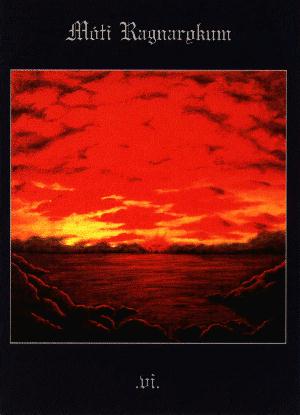 |
|
| Móti Ragnarokum | Towards Ragnarök |
| I
Hátt blæss Heimdallr, horn er á lopti; mælir Óðinn við Míms höfuð. Skelfr Yggdrasils askr standardi, ymr it aldna tré, en jötunn losnar; II Hvat er með Ásum? hvat er með álfum? gnýr allr jötunheimr, Æsir 'ró á þingi; stynja dvergar fyr steindurum veggbergs vísir. Vituð ér enn eða hvat? III Hrymr ekr austan, hefisk lind fyrir. Snýsk jörmungandr í jötunmóði: ormr knýr unnir en ari hlakkar, slítr nái niðfölr. Naglfar losnar. IV Surtr ferr sunnan með sviga lævi, skínn af sverði sól valtíva. Grjótbjörg gnata, en gífr hrata; troða halir helveg, en himinn klofnar. V Kjóll ferr austan, koma munu Muspells um lög lýðir, en Loki stýrir; fara fíflmegir með freka allir, þeim er bróðir Byleists í för. VI Þá kemr Hlínar harmr annarr fram, er Óðinn ferr við úlf vega, en bani Belja bjartr at Surti; þar man Friggjar falla angan. VII Gengr Óðins sonr við orm vega; Viðarr vega at valdýri; lætr hann megi hveðrungs mund um standa hjör til hjarta; þá er hefnt föður. VIII Þá kemr inn mœri mögr Hlóðynjar, gengr Óðins sonr við orm vega; drepr hann af móði Miðgarðs véurr; munu halir allir heimstöð ryðja; gengr fet níu Fjörgynjar burr neppr frá naðri níðs ókvíðnum. IX Sól tér sortna, sígr fold í mar, hverfa af himni heiðar stjörnur; geisar eimi ok aldrnari, leikr hár hiti við himin sjálfan. |
I
Loud blows Heimdall, his horn aloft; Odin speaks with Mim's head. The ash Yggdrasil shakes as it stands, the ancient tree groanes, the giant gets free. II What is it with the Æsir? What is it with the Elves? All giantland resounds. The Æsir are in council Dwarves groan before rock doorways frequenters of rock-walls. Know you yet of what? III Hrym drives from the east Holding his shield before him, Jormungand writhes in giant rage The serpent churns the waves The eagles screech with joy Darkly pale, it tears corpses Naglfar is loose. IV Surt travels from the south, With the stick destroyer (fire) Shines from his sword the sun Of the gods of the slain rock cliffs crash And troll-wives are abroad Heroes tread the road of Hel, And heaven splits. V Bark sails from the east Across the sea will come troops with Loki at helm All that monstrous brood Are there with the wolf In company with them is Byleist's brother. VI Then Hlin's second sorrow Comes to pass As Odin goes to fight the wolf And Beli's bright slayer against Surt There shall fall Frigg's delight VII Odin's son goes to fight the wolf Vidar on his way Against the slaughterous beast With his hand he lets his blade pierce The son of Hverdungs heart VIII So his father is avenged goes the great son of Hlodyn Dying to the serpent who shrinks from no shame And all the heroes shall then leave the world When Midgard's protector strikes his wrath! IX The sun will go dark Earth sink in the sea From heaven tanish bright stars Steam surges And life's fires flame Flickers against the very sky. |
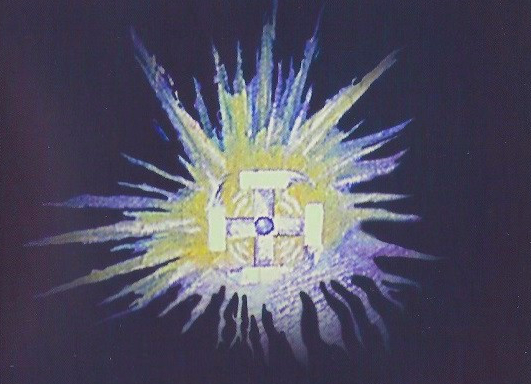
| ENGLISH | DEUTSCH | FRANÇAIS | The Thor's hammer, also called swastika, fyrfos, sun wheel or Hakenkreuz, is an ancient Indo-European symbol. It is a symbol of the life-giving powers of the Sun, as well as the life-sustaining powers of Thor. It is the most sacred symbol of the Nordic-Germanic tradition. | Der Hammer Tors, auch Swastika, Fyrfos, Sonnenrad oder Hakenkreuz genannt, ist ein altertümliches indo-europäisches Symbol. Es ist ein Symbol der lebensspendenden Kräfte der Sonne, sowie der lebenserhaltenden Kräfte Tors. Es ist das heiligste Symbol der nordisch-germanischen Tradition. | Le Þórshammer, également connu sous le nom de Swastika, croix Fylfot, roue du soleil, ou Hakenkreuz est un ancien symbole Indo-Européen. C'est le symbole des pouvoirs de don de vie du soleil, et des pourvoir de préservation de vie de Þórr. C'est le symbole le plus sacré de la tradition nordique. |
|---|